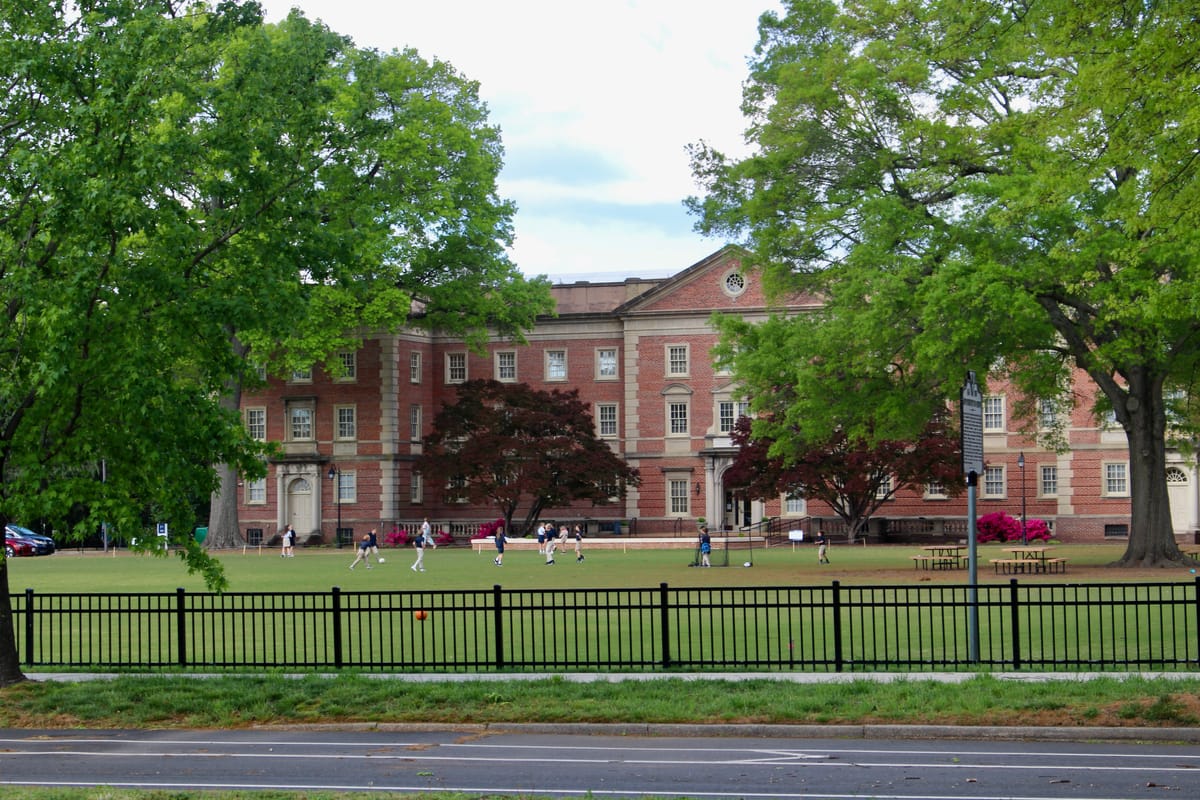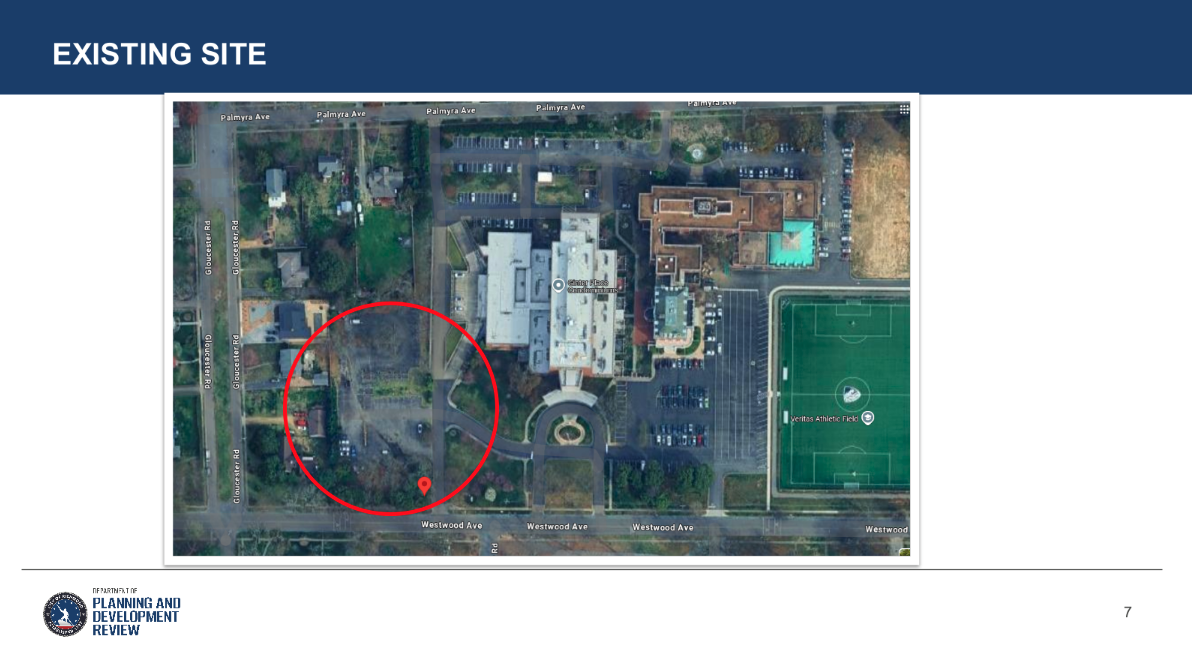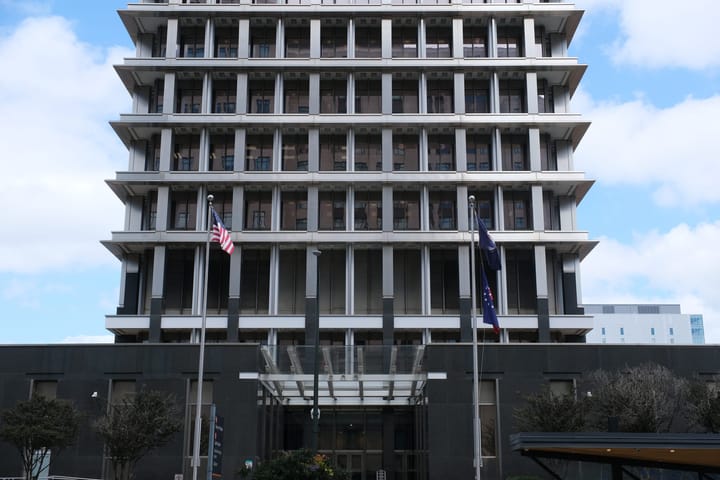Veritas tennis court clears divided Planning Commission

A proposal by a North Side private school to build six tennis courts on its Laburnum Park campus divided the Planning Commission Tuesday between those who saw it as a valuable addition to the neighborhood and those who sympathized with adjacent property owners unhappy about tennis noise and traffic.
Under a 2003 plan, the area where the Veritas School, a Christian school that offers students a classical education, wants to site the courts was intended for the construction of 13 townhouses. The homes were never built and today the land is a vacant parking lot.
“I’m surprised that there would be opposition to this, but obviously there is,” said Commission Chair Rodney Poole ahead of a 5-2 vote in favor of the project. “I will be supporting this predominantly because, instead of 13 townhouses, we’re providing tennis courts that will be used for about six weeks in the spring and about six weeks in the fall, and the rest of the time the use will be by neighbors.”
But Sharon Ebert, Richmond’s deputy chief for planning and economic development, said she had “concerns that we should do no harm to existing residents that live in the neighborhood.” And Commissioner Rebecca Rowe said that “along with the neighbors, I would not want a tennis court in my backyard.”

While the Planning Commission has no power to approve projects, its vote means the proposal will be sent to City Council with a recommendation for approval.
The tennis courts do not conflict with the area’s zoning; when attached to a permitted school, the courts are allowed in all of the city’s residential districts, noted Jennifer Mullen, an attorney representing Veritas. Veritas and its surrounding properties, however, are subject to what’s known as a community unit plan, a zoning tool recognized in the city’s charter and code that is used to regulate large-scale, mixed-use developments that are over 10 acres in size and don’t match an overall area’s zoning. Significant changes to that plan require both Planning Commission and City Council approval.
While Richmond has 115 community unit plans on its books, only about 21 are classified as active. The Ginter Place community unit plan, which encompasses Veritas’ property as well as the Ginter Place condominiums, was first approved in 2003 and last amended in 2008 to adjust a fence plan.
Veritas has been steadily acquiring property within the area since 2013, when it purchased much of the campus from the Baptist Theological Seminary. The six tennis courts it’s planning would sit at 1402 Westwood Ave., between the Ginter Place condos and several single-family houses and would let its teams practice on campus rather than traveling to Byrd Park.
The school has promised to erect a 10-foot fence around the courts with a sound suppression system and has said no lights will be installed.
The courts would be open between 8 a.m. and 8 p.m. While Veritas representatives said the gates would not be locked after 8 p.m., Mullen said a security system would be installed that will be monitored by the school’s director of security, who lives on the campus.
Some neighbors have praised the proposal. Rev. Ronald Cooper, whose Palmyra Avenue home would back up to one side of the courts, said he would prefer them instead of the originally planned townhomes “because I like my privacy.” Andrew Bleckley, a landscape architect who lives across the street from the proposed site, said the project would “transform an underutilized property to an active space that serves both the school and the surrounding neighborhood.”
But several of the immediately adjoining owners say the courts, which at their closest point are about 10 feet from the property line, are simply too near their homes.
“I am entitled to the quiet enjoyment of my home, and the intrusive noise of six tennis courts is an unreasonable burden for me and my neighbors to bear,” said Chris Hilbert, a former member of City Council who lives at the Ginter Place condos. “While my situation may be bad, the homes on Gloucester Avenue abutting the property to the west face an absolutely intolerable situation.”
Anshu Verma, who with Tyler Coulson owns one of the Gloucester Avenue properties, said that with the exception of one person, all of the abutting owners “are in opposition” to the courts.
“I think that needs to be considered,” she said. “We would be most affected.”
Councilor Kenya Gibson, who represents the 3rd District where Veritas sits, urged the Planning Commission to delay its vote, saying Veritas “has more work to do to get community support amongst their immediate neighbors.”
How much outreach the school had done on the tennis courts caused some debate after several neighbors complained they had been blindsided. While Veritas said it had included the courts in a master plan it's been presenting to civic associations over the past 15 months and had gone door-to-door to speak to adjoining residents in recent weeks, the school said it had only held one dedicated community meeting on the tennis proposal at 8 a.m. last week.
Poole, who lives close to Veritas on Seminary Avenue, was firm in his belief that “there’s been significant public engagement” by the school throughout its planning process.
But Rowe pushed back, saying that a single community meeting on a weekday morning to discuss the tennis plan wasn’t sufficient.
“It is the best practice to have a second meeting at a different time of day,” she told Poole. “So I understand what you’re saying, but I don’t think it makes what I’m saying wrong.”
Contact Reporter Sarah Vogelsong at svogelsong@richmonder.org






